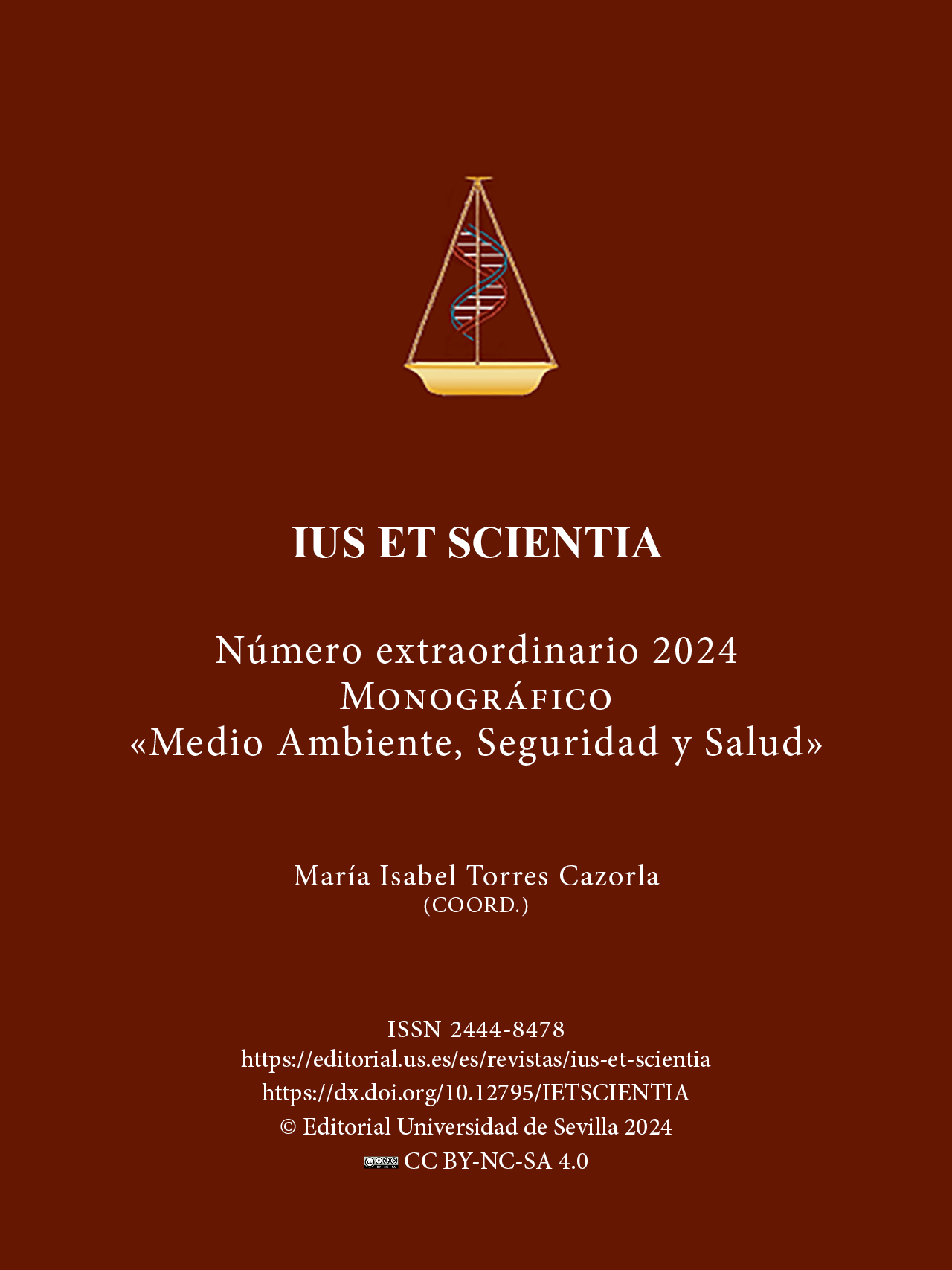Children and Young People as Climate Litigants Before the European Court of Human Rights: the Duarte Agostinho Case
DOI:
https://doi.org/10.12795/IESTSCIENTIA.2024.mon.02Keywords:
Climate litigation, Human rights, Children rights, Climate justice, European Court of Human RightsAbstract
Strategic human rights-based climate litigation is becoming a widely used tool to hold states to meet their climate commitments. Likewise, a good number of these cases are led by children or young people who have filed the corresponding climate demands both before national jurisdictions and before international bodies. One of them is the Duarte Agostinho case, in which six Portuguese children and young people have sued 33 States before the European Court of Human Rights. This article examines the arguments raised by the Duarte Agostinho case in relation to the respect and protection of human rights and climate change and its potential for achieving climate justice.
Downloads
References
ABRISKETA URIARTE, J. (2012), «Los problemas del Tribunal Europeo de Derechos Humanos para aplicar el Derecho internacional humanitario», Revista de Derecho Comunitario Europeo, núm. 43.
ARTS, K. (2019). «Children’s Rights and Climate Change», en Children’s Rights and Sustainable Development: Interpreting the UNCRC for Future Generations, Fenton-Lynn, Claire (ed.) , Ed. Cambridge University Press.
BRAIG, K. y PANOV, S. (2020) «The Doctrine of Positive Obligations as a Starting Point for Climate Litigation in Strasbourg: The European Court of Human Rights as a Hilfssheriff in Combating Climate Change?», Journal of Environmental Law and Litigation, núm.35.
DONGER, E. (2022) «Children and Youth in Strategic Climate Litigation: Advancing rights through Legal Arguments and Legal Mobilization», Transnational Environmental Law, núm.11.
FAJARDO DEL CASTILLO, T. (2018) «El Acuerdo de París sobre el Cambio Climático», Revista Española de Derecho Internacional, núm.70.
GALVAO, P. (2020) «Derechos Humanos y Cambio Climático. Un desafío para el Siglo XXI», Anuario de los Cursos de Derechos Humanos de Donostia-San Sebastián, núm.20.
GARCÍA MARTÍN, L. (2024), Litigación climática liderada por niños y jóvenes: análisis de su contribución a la acción climática global. Ed. Aranzadi.
GIBBONS, E. (2014) «Climate change, children’s rights, and the pursuit of intergenerational climate justice», Health and Human Rights Journal, núm. 16.
IPCC, Sexto Informe de Evaluación del Panel Intergubernamental sobre el Cambio Climático 2023.
KELLER, H. y HERI, C. (2022) «The Future is Now: Climate Cases Before the ECtHR», Nordic Journal of Human Rights, núm.40.
KELLER, H., HERI, C. y PISKÓTY, R. (2022) «Something Ventured, Nothing Gained? - Remedies before the ECtHR and Their Potential for Climate Change Cases», Human Rights Law Review, núm.22.
KOBYLARZ, N. (2018) «The European Court of Human Rights: An Underrated Forum for Environmental Litigation» en Sustainable Management of Natural Resources: Legal Instruments and Approaches, Tegner Anker, Heller y Egelund Olsen, Birgitte (eds.), Ed. Intersentia.
LEWIS, B. (2021) «The potential of international rights-based climate litigation to advance human rights law and climate justice», Griffith Journal of Law & Human Dignity, núm.9.
LISTON, G. y KINGSLEY CLARK, P. (2023) «Climate Litigation before International Tribunals» en Litigating the Climate Emergency. How Human Rights Courts and Legal Mobilization can bolster Climate Action, Rodríguez-Garavito, César (ed.) Ed. Cambridge University Press.
MAGUIRE, R. y LEWIS, B. (2012) «The influence of justice theories on international climate policies and measures» Macquarie Journal of International and Comparative Environmental Law, núm. 8.
MAVRONICOLA, N. (2021) «The Future is a Foreign Country: Rethinking State Behaviour on Climate Change as Ill-Treatment», University of Birmingham New Approaches, núm.1.
MCINTYRE, O. y MOSEDALE, T. (1997) «The precautionary principle as a norm of customary international law», Journal of Environmental Law, núm. 9.
MILANOVIC, M. (2024, Abril 9) «A Quick Take on the European Court’s Climate Change Judgments», EJIL:Talk!.
NOLLKAEMPER, A. (2018) «The Duality of Shared Responsibility», Contemporary Politics, núm.24.
PARKER, L., MESTRE, J, JODOIN, S. y WEWERINKE-SINGH, M. (2022) «When the kids put climate change on trial: youth-focused rights-based climate litigation around the World», Journal of Human Rights and Environment, núm.64.
RODRÍGUEZ-GARAVITO, C. (2023), «Litigating the Climate Emergency: The Global Rise of Human Rights-Based Litigation for Climate Action» en Litigating the Climate Emergency. How Human Rights Courts and Legal Mobilization can bolster Climate Action, Rodríguez-Garavito, César (ed.), Ed. Cambridge University Press.
ROSEMARY L. (2017), «Climate Justice, Adaptation and the Paris Agreement: A Recipe for Disasters?», Environmental Politics, núm.26.
SPIELMANN, D. (2012) «Allowing the Right Margin: The European Court of Human Rights and The National Margin of Appreciation Doctrine: Waiver or Subsidiarity of European Review?», Cambridge Yearbook of European Legal Studies, núm.14.
TURCO, M., JEREZ, S., AUGUSTO, S., TARÍN-CARRASCO, P., RATOLA, N., JIMÉNEZ-GUERRERO, P. & TRIGO, R. (2019) «Climate Drivers of the 2017 Devastating Fires in Portugal», Scientific Reports, núm. 9.
Published
How to Cite
Issue
Section
License
Copyright (c) 2024 Laura García Martín

This work is licensed under a Creative Commons Attribution-NonCommercial-ShareAlike 4.0 International License.
Those authors being published in this journal agree to the following terms:
- Authors retain their copyright and they will guarantee to the journal the right of first publication of their work, which will be simultaneously subject to license recognition by Creative Commons that allows others to share such work provided it is stated the author’s name and his first publishing in IUS ET SCIENTIA.
- Authors may take other non-exclusive distribution license agreements version of the published work (e.g. deposit in an institutional digital file or publish it in a monographic volume) provided it is stated the initial publication in this journal.
- It is allowed and encouraged that Author s disseminate their work via the Internet (e. g. institutional digital files or on their website) prior to and during the submission process, which can lead to interesting exchanges and to increase citation of the published work.
- Abstract 77
- PDF (Español (España)) 52
- HTML (Español (España)) 30





